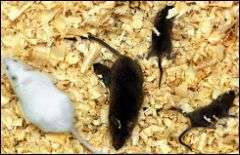September 18, 2012 report
Researchers identify gene partly responsible for maternal care in mice

(Medical Xpress)—The medial preoptic area of the brain has been found over the years to be very closely involved with certain behaviors in mice, such as sexual proclivity, locomotion, aggression and the motivation to care for young. The chemistry involved in such behavioral activity has unfortunately though, remained rather a mystery. Now a team of researchers working at Rockefeller University have found, as they describe in their paper detailing their findings published in the Proceedings of the National Academy of Sciences, that a gene encoding estrogen receptor protein called ERα which is expressed in neurons in the preoptic part of the mouse brain, appears to impact the degree to which mice care for their young.
The team used a technique called viral-vector mediated RNA interference to cause the neurons in the brains of several female test mice to change how much ERα they expressed and then monitored the results. They report that those mice with silenced or reduced amounts of ERα chased down their pups less when they moved away, licked and nursed them less and in general were much more lackadaisical regarding their care. They also found they were less open to sexual dalliances, though interestingly, they also found that such altered mice were no more aggressive than normal mice, indicating just how specific the ERα protein really is.
The researchers came to focus on ERα after studying research by others that had shown that neural cells tended to react strongly to the female sex hormone estrogen. Other researchers had found, among other things, high levels of ERα in estrogen which signaled a likely connection. To find out how strong that connection might be the team caused both a reduction in ERα in test mice and then complete silencing.
The team notes that they found it remarkable that the manipulation of just one gene causing a change in just one protein, could cause such a profound and observable change in behavior, an observation that could lead to new ways of thinking about the roots of behavior in people and the ways it might be manipulated in the future by those that know where to look.
More information: siRNA silencing of estrogen receptor-α expression specifically in medial preoptic area neurons abolishes maternal care in female mice, PNAS, Published online before print September 17, 2012, doi: 10.1073/pnas.1214094109
Abstract
The medial preoptic area has been shown to be intricately involved in many behaviors, including locomotion, sexual behavior, maternal care, and aggression. The gene encoding estrogen receptor-α (ERα) protein is expressed in preoptic area neurons, and a very dense immunoreactive field of ERα is found in the preoptic region. ERα knockout animals show deficits in maternal care and sexual behavior and fail to exhibit increases in these behaviors in response to systemic estradiol treatment. In the present study, we used viral-vector mediated RNA interference to silence ERα expression specifically in the preoptic area of female mice and measured a variety of behaviors, including social and sexual aggression, maternal care, and arousal activity. Suppression of ERα in the preoptic area almost completely abolished maternal care, significantly increasing the latency to pup retrieval and significantly reducing the time the moms spent nursing and licking the pups. Strikingly, maternal aggression toward a male intruder was not different between control and preoptic ERα-silenced mice, demonstrating the remarkably specific role of ERα in these neurons. Reduction of ERα expression in preoptic neurons significantly decreased sexual behavior in female mice and increased aggression toward both sexual partners and male intruders in a seminatural environment. Estrogen-dependent increases in arousal, measured by home cage activity, were not mediated by ERα expression in the preoptic neurons we targeted, as ERα-suppressed mice had increases similar to control mice. Thus, we have established that a specific gene in a specific group of neurons is required for a crucially important natural behavior.
© 2012 Medical Xpress
















